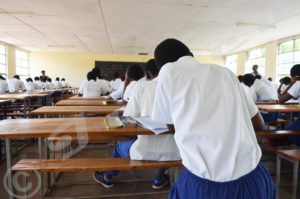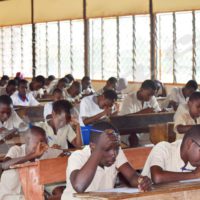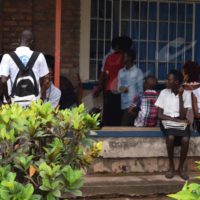To protect their children sent out of school for an entire school year from harm and distractions, parents ask the government to think of a way to keep those pupils in a school atmosphere.

10th graders sitting for the National Test
Amidst the worry of seeing the life and future of their children jeopardized, parents from Kabezi education district request competent authorities to come up with a plan to help supervise 9th graders who will have to wait a year at home till they do again the national test admitting them to Post-Basic Education. “We are worried about what might happen to our children if they remain at home for an entire school year. The government should come up with a supervision plan for our children so that they remain school-minded. They could for example take two or three days a week to keep them busy in a school environment”, says Marie Goreth Mpawenimana, the mother of Pacifique who failed the 9th grade test. Many other parents share her fears: “If children are sent home, they have nothing to help them keep their mind set on studies” says Estelle N. “They should find a way to protect our children”, says Zacharie Sinzotuma.
For parents and pupils alike, the chances for the latter to remain undistracted and ready for the next test are very low. Parents claim that their children are susceptible to incidents such as premature marriages ending in divorce and fear they might be involved in crimes such as robbery. “It is painful to think that our children will interrupt their studies for that period. There are many distractions especially for girls. The life of our children will be put in a very dangerous situation”, says Mpawenimana. “If those children are sent home, are we foolish enough to believe they will spend the whole year thinking about school when there is nothing to make them do so? Won’t they think about other life issues?” wonders Estelle N. “If there is no school to keep them controlled, I am afraid our children will be involved in criminal activities”, says Sinzotuma, the father of Gervais.“There are many distractions when you are not studying”, says Pacifique Arizera, a daughter of Mpawenimana who failed the 9th grade test. In the same way, Gervais Mpawenimana, a 9thgrader says, “after one year at home, my mind might be filled with other things, not studies”.
Pupils say they will lose the organisation and support they get from school. “School helps us keep organised and safe from distractions. If you are not attending school, you feel no motivation to revise. You don’t know how to organise your revision sessions”, says Arizera. “Even if we manage to revise, where will we find anyone to help us with what we don’t understand?”, says Gervais. That’s not the only reason they fear they might not succeed when they do again the test as revealed by those pupils. “I hear mathematics textbooks have been changed. How can I expect to pass the test if I didn’t study the content of those books?” says Pacifique. The problem becomes even harder for pupils who failed the 10th grade test and therefore will have to do the 9th grade test next year. “I didn’t pass the 10th grade test. With the new system, I will have to sit a year at home and then go to do the 9th grade test when I have no idea whatsoever about what they study in the Basic Education system. Failure is inevitable”, says Sakina Irankunda, a 10th grader who passed all the class exams except the 10th grade test.
9th graders of the school year 2015-2016 were the first class of the new Basic Education system. The admission to the first year of Post-Basic Education will be selective. Only pupils who passed the national selection test will be admitted. According to regulations, those who failed the test whereas they have succeeded in other class exams will not be allowed to attend studies again. They will wait for the next test after a year at home. As for 10th graders of the old system who failed their test, they will sit for the next Basic Education 9th grade test after a year at home as the 9th graders.


















 IWACU Open Data
IWACU Open Data

